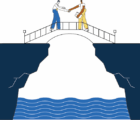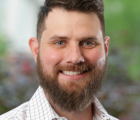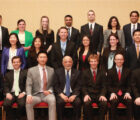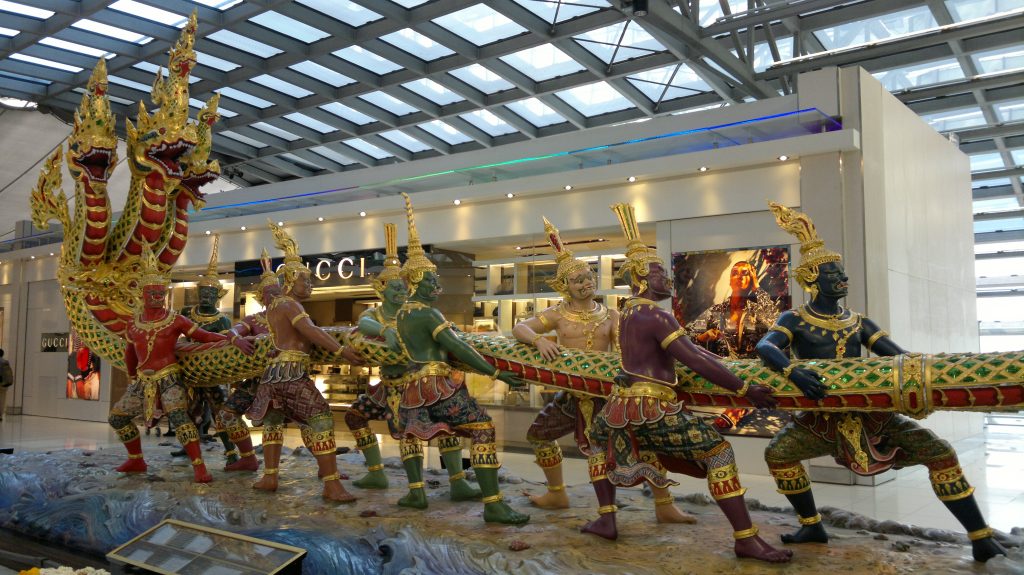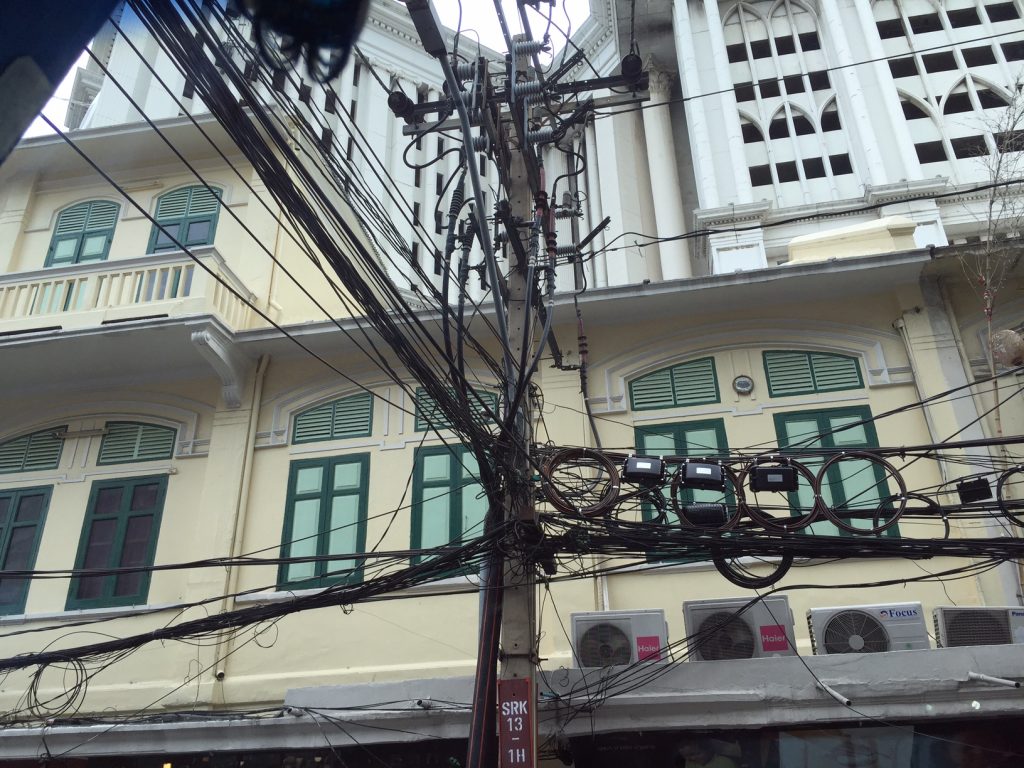Traveling is a truly symbiotic relationship for Mary Frances Miller: She imparts her knowledge and gains new found wisdom through the course of her journeys.
She has snacked on fried crickets in Mexico, haggled over silk in India and reviewed Emperor Qin’s terra cotta troops in China. Mary Frances Miller has visited more than 30 countries, many while working or volunteering as an actuary. Along the way, she has gained a front row seat to global trends in the business. And in March 2015, her volunteer trips to Uganda, Malaysia and Thailand yielded not just a few more stamps in her passport, but a batch of fresh insights on emerging markets as well.

At home, Miller cheers on the Nashville Predators hockey team at every home game and races sighthounds, counting two whippets, two Salukis and a greyhound as part of the family. She cofounded Select Actuarial Services in 1999 and continues to work there as a senior consulting actuary, specializing in risk management consulting. “Our clients tend to be Fortune 1000 companies that only buy insurance for catastrophes,” says Miller. With clients ranging from hospitals dealing with medical malpractice claims to the school district pool of the state of Colorado, Miller explains, “We’re a little bit of a niche player. We get to touch a lot of different things that way.”
It was actuarial work that turned Miller into an international traveler. In the early 1990s she began working on the liquidation of a consortium of small insurance companies in London that had gone bankrupt. “If there was a risk you could write in the ’80s and ’90s that was bound to lose money, and a lot of it,” she recalls, “they would write it.” One of Miller’s clients suffered huge product liability losses in the bankruptcy, and she began traveling to London several times a year to resolve the financial issues. But what began as a series of business trips turned into a romance.
“I really fell in love with the city,” Miller says. “Then I started to get involved internationally for the CAS. It all grew from there.”
Postcard from Uganda

In March, Miller volunteered for Actuaries Without Borders, a section of the International Actuarial Association that provides training for actuaries and actuarial technicians in countries where the profession is just getting off the ground. She left the spring of Nashville behind and embarked on a two-day journey to reach Uganda, where the dry season was just ending. The unpaved streets of Kampala were coated in red dust and motorcycle taxis zoomed around the roundabouts as Miller toured the capital city. She was there to teach a three-day seminar on ratemaking and reserving to college graduates who were working for insurance companies and starting the exam process.
“My idea was to provide some really practical training on how to figure out whether you’re collecting the right amount of money on the ratemaking side,” she says. “And on the reserving side, how to tell what your ultimate costs are going to be, not just what’s been reported so far.”
When she met her students, Miller discovered that some had travelled from as far away as Kenya to attend the seminar. Much of the buzz in class centered on sweeping changes to auto insurance in Uganda — changes that could provide new opportunities for actuaries. While auto insurance is required in the country, Miller says, “It’s like a sticker that you buy to stick on your car. It’s really cheap, but the benefits are really minimal.” However, in the next three to five years, insurance limits will increase dramatically, and companies will be allowed to set their own rates.

On the last day of class, Miller was surprised to find that her class had become hot business news in Uganda. The professor who organized her seminar was asked to appear on TV. Then at the end of the day, she discovered she was giving a speech at a public event. Once she got over her shock, Miller says, “One of my suggestions was be very, very cautious … I said your results may look really good in the beginning because your citizens don’t understand insurance … but once they figure out that they can file claims and that it’s worth something, then your experience is going to get much worse, very fast.”
Although Makerere University in Kampala offers an actuarial science degree, Miller found that many of her students from Uganda were still struggling professionally. “It’s a chicken or the egg question,” she says. “There isn’t a lot of demand for actuaries in the industry, because the industry doesn’t really know yet what to do with an actuary. There’s no way for the new graduates to ever get beyond beginner status. So breaking the cycle can be very difficult.”
The students from Kenya, on the other hand, seemed to have more opportunities. “Health insurance has really taken off there,” she says. “It took off and was a disaster for a number of companies, because they had that ‘we’re bringing in a lot of cash, so we must be making a profit’ approach to things … but the companies that actually got some actuaries involved have remained solvent and done much better. There are some real examples of how actuaries can contribute.”
Meetings in Malaysia
In Malaysia, a similar story is now unfolding. Although the Malaysian government has set auto insurance rates in the past, the country is on the cusp of letting insurance companies set their own rates. The changing scene led the CAS to join with the Actuarial Society of Malaysia and the Australian Institute of Actuaries to offer a two-day seminar on ratemaking in Kuala Lumpur. The seminar, slated for September 2015 (see story in AR, January/February 2016), needed an additional instructor, and as Miller admits, “It doesn’t take much to get me on an airplane.” She packed up her PowerPoints based on the CAS Exam 5 textbook and headed off to the airport.
“Even if [actuaries] can’t tell you what to charge, they can tell you [which risks] to write.”
Miller describes the business environment in Malaysia as “a mix — the regulation is British-based, but the actuaries there mostly take the U.S. exams.” And while her students learned during class time, Miller picked up a lot of interesting information while chatting during the lunch breaks. She also fielded some tough questions from students who are now taking the CAS exams, ranging from the time it takes to get the CAS credential to nation-specific exam material that isn’t relevant for the countries in which they work.
Another hot topic with the advanced students in Malaysia was finding a business niche in a tariffed environment where the government sets insurance rates. As Miller notes, “Even if [actuaries] can’t tell you what to charge, they can tell you [which risks] to write.” In Malaysia, she says, “There aren’t that many rates. It’s like, ‘is your car big or small?’ It’s very, very simple. So if you can focus on particular parts of the country, or particular kinds of drivers, you can probably make a lot more money than your competitors. And that’s what actuaries are really good at.”
Doing Business in Bangkok

With the year 2015 winding down, Miller packed her bags yet again — this time, because of a coincidence concerning crop insurance. Not many American actuaries work with agricultural insurance, but Miller has, and the CAS decided to focus on the topic for its panel at the Asian Actuarial Conference in Bangkok, Thailand in November 2015.
According to Miller, “Agricultural insurance is one of the biggest lines of business in East Asia because they have huge flooding issues.” Miller joined CAS President Bob Miccolis and CAS member Rade Musulin in the panel discussion. After the presentation, Miller says, “I got a lot of questions about things like adverse selection. It was obvious to me that the people who stopped me afterward were very knowledgeable actuaries and were putting a great deal of thought into what I had presented and whether they could use it elsewhere.”
Because it was Miller’s first trip to Bangkok, she made time to catch a water taxi down the Chao Phraya River to one of the city’s famous night markets, where shoppers can buy everything from traditional Thai puppets to fried oysters.
Have Suitcase, Will Volunteer
Miller loves to travel, but she’s equally passionate about volunteering for the CAS. “My view of the world — not just of actuaries, but of the world in general — is so much broader than it ever would have been had I not gotten involved in the CAS,” she says. Miller began volunteering as soon as she became a Fellow, partly because it was required for her job. “That meant that I started interacting with actuaries from outside my company right away, very early on in my career,” she says. According to Miller, volunteering has made a big difference in her professional growth. “I’m a much, much better actuary,” she says, “for all of the people that I know through this organization.”

Volunteering outside of the United States has also given her a fresh perspective on the profession. “Our view toward the proper way to regulate insurance tends to be very biased toward how we do it in the U.S.,” she says. “Which isn’t to say that it’s right or wrong, it’s just not necessarily the only way.” On the other hand, she’s found that Europeans can be equally biased about doing things the EU way. In the end, she says, “What you discover is neither way is exactly right … when we get to the International Actuarial Association, and we’re trying to work on something that needs to be international, you kind of have to find a compromise.”
“Our view toward the proper way to regulate insurance tends to be very biased toward how we do it in the U.S. which isn’t to say that it’s right or wrong, it’s just not necessarily the only way.”
That difference in perspective was driven home to her a few years ago while she was touring World War II sites on the island of Singapore. “We’re on the bus,” she recalls, “and we’re coming up to the first stop, and the tour guide says, ‘early on the morning of December 8, 1941, the Japanese bombed the American base at Pearl Harbor in Hawaii.’ And I wanted to put my hand up and say, ‘I think it was December 7!’” Miller realized that in Singapore, located across the International Date Line from Hawaii, the attack happened on their December 8, which is how they tend to remember it. “I’ve learned a great deal about the fact that there are different perspectives on everything,” she says.
As valuable as that insight was, Miller has found that there are some differences that can’t be overcome — and for her, one of those differences is sea cucumber, a delicacy she encountered at a banquet in China. (“I will eat almost anything,” she says. “But it was slimy and rubbery.”) Fortunately, the dinner was almost at an end, and Miller was able to avoid taking a second bite of the meal’s grand finale by pleading a full stomach.
While one taste of sea cucumber was more than enough, Miller does not feel the same way about the countries she has visited while volunteering for the CAS. “I’ve been to these places,” she says, “but I never end up having more than a few days to be a tourist. So my bucket list of places where I’d like to go back just keeps growing.”
Laurie McClellan is a freelance writer and photographer living in Arlington, Virginia. She is on the faculty of Johns Hopkins University, where she teaches in the M.A. in Science Writing program.







